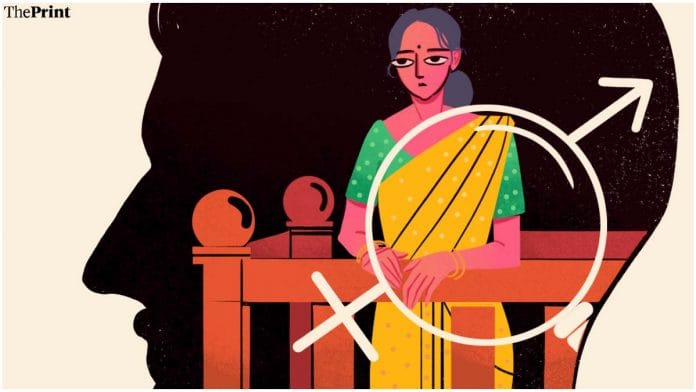New Delhi: Interim maintenance or permanent alimony can be claimed under the Hindu Marriage Act, 1955 even if a marriage is declared void, the Supreme Court said Wednesday.
The clarification by a bench comprising Justices Abhay S. Oka, Asanuddin Amanullah and Augustine George Masih came in response to a reference that was made to a larger bench on 22 August 2024 in view of conflicting judgements by a two-judge bench.
The questions that were posed for the Justice Oka-led bench was whether a spouse of marriage declared as void under the Act is entitled to claim permanent alimony under the law and also whether maintenance can be ordered when a petition seeking a declaration that the marriage was void is pending.
Essentially, the court was asked to determine whether a judicial order declaring a marriage void would mean “decree” under the two provisions of Act that deal with interim maintenance and permanent alimony.
ThePrint explains the judgement and the provisions that were discussed to give the ruling.
Also Read: SC says registered Hindu marriage invalid without requisite ceremonies. ‘Can’t trivialise process’
Sections scrutinised in detail
The two-judge bench reference order had taken note of seven judgements—two that favored granting alimony in cases of void marriage and five that held otherwise.
Before the three-judge bench that gave the ruling, some relevant provisions, especially 5, 11, 24 and 25, of the Act came up for consideration.
Section 5 deals with conditions for a valid marriage, including the minimum age of 21 and 18 for the bride and the groom, under the Hindu Marriage Act.
It says that neither party should have a spouse living at the time of marriage; neither should be incapable of giving a valid consent or should be suffering from mental disorder to be unfit for marriage and procreation, or has been subject to recurrent attacks of insanity; parties are not within prohibited relationship unless the custom permits it and parties are not ‘sapindas’ (sharing of common ancestors).
Section 11 deals with void (i.e., illegal at its inception) and voidable marriages. A marriage is void if either of the parties has a spouse living at the time of entering into a wedlock, or the marriage is between degrees of prohibited relationship or if parties are ‘sapindas’ of each other.
Sections 24 and 25 related to the grant of interim maintenance and permanent alimony. While Section 24 is on interim maintenance when proceedings are pending before the court, Section 25 speaks of granting permanent alimony or maintenance when a final decree is passed in a proceeding. Maintenance and alimony can be sought by either the wife or the husband.
While ordering interim maintenance, the court has to determine that either the wife or husband has no independent or sufficient income. However, there are conditions under the law that allows the court to modify the order on interim maintenance.
The arguments revolved around whether the term “decree” would include a judicial order in a case of void marriage. The first view put across before it was that only a divorce or judicial separation decree should be considered for the purpose of maintenance under Sections 24 and 25.
A void marriage decree should be kept out of its purview, the court was told. It was also argued that maintenance under Sections 24 and 25 cannot be ordered in a marriage that does not exist since the parties cannot claim to be a spouse and, therefore, an illegitimate wife cannot be equated to a divorced wife.
After analysing all these legal provisions and the contradictory judicial pronouncements, the bench opined that the law, specifically Section 25, contemplates categories of petitions that can be filed under the law for different reliefs at the time of passing a decree or at any time later.
It said a cause of action to apply for permanent alimony arises when a decree is passed by any court exercising its jurisdiction under the law. And, since the legislature has not made a distinction between a decree of divorce and declaring a marriage null and void, therefore, it would not be possible to exclude a decree of nullity from the purview of Section 25.
The bench declared Section 25 confers rights on the spouses of the marriage declared as void under Section 11 of the law to claim maintenance. This right, it explained, is created in favour of both spouses once a decree is passed. Besides, this provision also confers a matrimonial court the power to grant permanent alimony at the time of passing any decree, including which declares a marriage null and void.
Applying the same principle to Section 24, the SC declared that interim maintenance, too, can be granted when a petition to declare a marriage void is pending. “Even if a court comes to a prima facie conclusion that the marriage between the parties is void or voidable, pending the final disposal of the proceeding under the 1955 Act, the court is not precluded from granting maintenance pendente lite…”
However, the bench made it clear that the law makes it discretionary for the court to order maintenance under Section 25.
“If the conduct of the spouse who applies for maintenance is such that the said spouse is not entitled to discretionary relief, the court can always turn down the prayer for the grant of permanent alimony under Section 25 of the 1955 Act. Equitable considerations do apply when the court considers the prayer for maintenance under Section 25,” the bench said.
(Edited by Tony Rai)
Also Read: How courts established that only saptapadi, not kanyadaan, is essential for Hindu marriage






